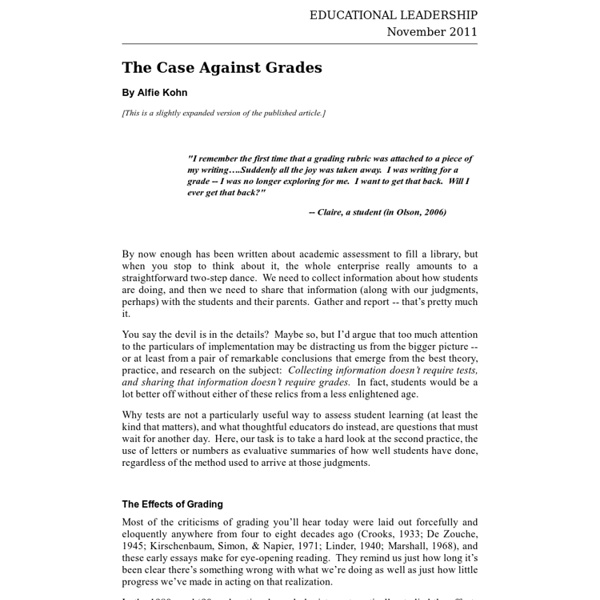Project Based Instruction in STEM Education
Mindset (book)
Carol S. Dweck (born October 17, 1946) is the Lewis and Virginia Eaton Professor of Psychology at Stanford University.[1] She graduated from Barnard College in 1967 and earned a Ph.D. from Yale University in 1972. She taught at Columbia University, Harvard University, and the University of Illinois before joining the Stanford faculty in 2004. Contributions[edit] Professor Dweck has primary research interests in motivation,[2][3][4][5][6][7] personality, and development. "In a fixed mindset students believe their basic abilities, their intelligence, their talents, are just fixed traits. This is important because (1) individuals with a "growth" theory are more likely to continue working hard despite setbacks and (2) individuals' theories of intelligence can be affected by subtle environmental cues. Selected publications[edit] Dweck, C. Sources[edit] See also[edit] Goal orientation References[edit]
Diane Ravitch's blog
Learning Through Failure - Getting Unstuck
"Spectacular failure is better than moderate success." - Faste, Stanford Dept Mechanical Engineering How many of us can say this after a spectacular failure? For those whose jobs day-to-day innovation, this often is one of their secrets of success. One of the books I'm reading now is To Engineer is Human. It doesn't take long to get Petroski's message - failure is involved in any successful design. The problem is, we often don't hear about failures - and the problem is more severe in schools. One of the most pernicious things about hiding failure for students is that it discourages healthy risk-taking and can have profound intellectual and creative stunting consequences in adulthood. Resilience and optimism may not come easy for some kids, so it's important to know how to encourage in a way that is credible but also constructive. Technorati Tags: learning, motivation, engineering, creativity, innovation, mistakes, education, perfectionism, gifted, entrepreneurship, optimism, EQ
This is your brain on Jane Austen, and researchers at Stanford are taking notes
Stanford Report, September 7, 2012 Researchers observe the brain patterns of literary PhD candidates while they're reading a Jane Austen novel. The fMRI images suggest that literary reading provides "a truly valuable exercise of people's brains." By Corrie Goldman The Humanities at Stanford L.A. Researcher Natalie Phillips positions an eye-tracking device on Matt Langione. The inside of an MRI machine might not seem like the best place to cozy up and concentrate on a good novel, but a team of researchers at Stanford are asking readers to do just that. In an innovative interdisciplinary study, neurobiological experts, radiologists and humanities scholars are working together to explore the relationship between reading, attention and distraction – by reading Jane Austen. During a series of ongoing experiments, functional magnetic resonance images track blood flow in the brains of subjects as they read excerpts of a Jane Austen novel.
Ordo Amoris: Norms and Nobility Prologue IV: I Am, I Can, I Ought, I Will
Some 100 years before David Hicks penned Norms and Nobility , in the Lake District of England, Charlotte Mason wrote these words as an educational philosophy: "I am, I can, I ought, I will." We moderns like to say," I am and I can," but we lose even the little we have by not adding, "I ought and I will." From those 4 phrases we can move towards a philosophy of education as Charlotte Mason did in her original series and as David Hicks does in Norms and Nobility. It is appropriate that Hicks ends his prologue with that nasty word "ought." I don't mean to embarrass anyone but we have the great fortune to have picked up Krakovianki for some of this study. Also please link to your posts in the comments. I will end this section with a couple of quotes from section IV. "David Halberstan (The Best and the Brightest )warns against the pride and blindness that operational brilliance is heir to. Question: Does it?
MOOCs—Implications for Higher Education
“MOOCs,” an acronym for “massive open online courses,” denotes an important, possibly a revolutionary, development ineducation. These courses are online, free of charge, open to anyone in the world who has a laptop and an Internet connection, and offered by entities with strange names such as coursera, codeacademy, edX, khanacademy, and udacity. The offerors are mainly university consortia or university-affiliated. Moreover, and critically, the universities are elite universities like Stanford, Berkeley, Harvard, and Columbia. Not that online education is new; there are adult-education online courses such as are sold by The Teaching Company; there are even online college degree programs, offered mainly by for-profit colleges. The courses, like conventional college courses, are sequenced by difficulty, enabling the student to progress from beginner to advanced. The format seems superior to the conventional lecture. It may help to see this by thinking of MOOCs in demand and supply terms.
Online Courses and the Future of Higher Education
Online courses began around 1990 with the growth of more widespread access to the Internet. They spread rapidly in the United States during the last half of the 1990’s buoyed by the dot-com boom, and fell sharply after that bubble burst. During this early period, online courses typically charged fees. Some of the courses catered to individuals who wanted to improve their job prospects, others were meant solely for intellectual enjoyment, while some could be used to obtain college degrees. For-profit schools with physical facilities, such as DeVry University and the University of Phoenix, were often sponsors of online courses, although a few of these courses were sponsored by nonprofit universities. What is new about the MOOCs (which stands for “massive open online courses”) is not the use of the Internet to instruct in particular subjects, but that they are free, and they often are sponsored by some of the very best universities, such as MIT, Harvard, and Stanford.



